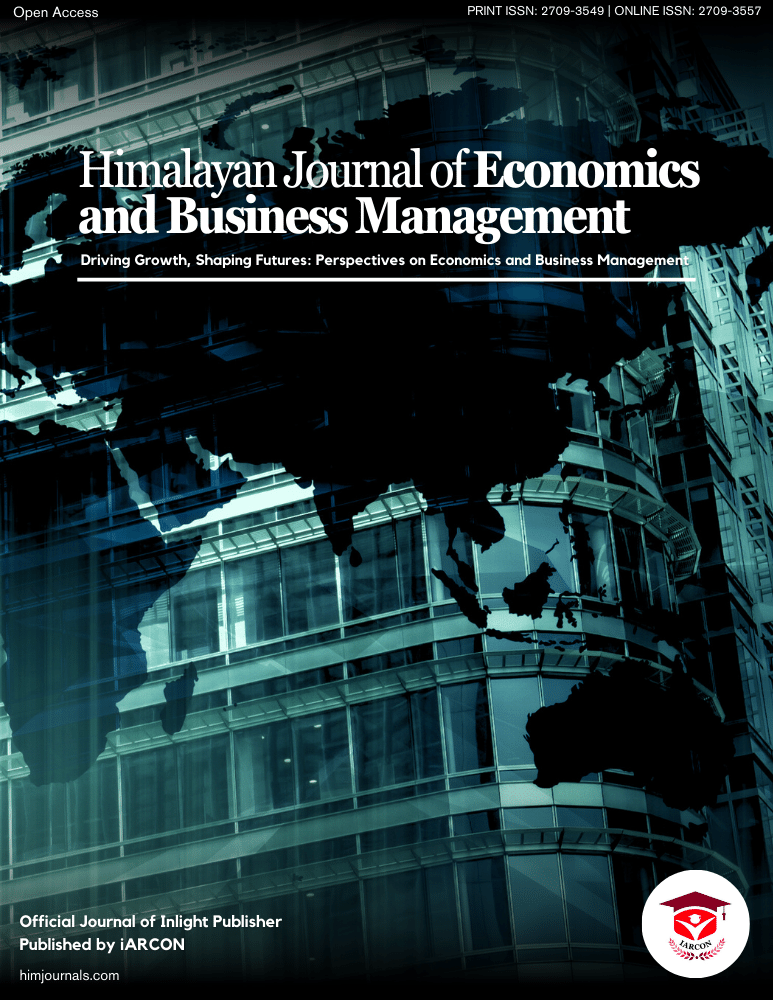In today's highly competitive business environments, companies are always looking for strategies to gain a competitive advantage that will allow them stand out from their competitors and lead them toward long-term success. In the pursuit of organizational excellence, talent management has emerged as a pivotal factor among the various strategies and techniques being implemented. The complex interaction of talent, organizational objectives and operational effectiveness has elevated talent management as a prominent topic of deliberation in both corporate boardrooms and academic spheres. Since its emergence in the 1990s, talent management has been promoted as a means for firms to augment their competitive advantages [1]. The scarcity of talent was widely recognized and firms were actively involved in a competitive pursuit for talented individual [2].
According to a prominent study of [3] the fundamental concept of Talent Management (TM) is in the notion that organizations can enhance their operational effectiveness and efficiency by actively acquiring, nurturing and retaining skilled employees. Meanwhile, TM is defined as the interconnected set of activities that are utilized by an organization to recruit, retain, motivate and develop the abilities and skills of talented people that are required in order for the organization to carry out its functions [4]. Therefore, it is widely believed among scholars that the use of talent management strategies by firms leads to increased competitiveness and improved alignment with long-term business objectives [1].
The examination of various viewpoints on talent is crucial to understand the talent philosophies implemented by businesses, which encompass their perceptions, management and governance of talent [4]. Meanwhile other scholars [5] define talent as the "inherent capacities of individuals that are systematically nurtured, utilized in valued activities, considered significant and warrant effortful investment." Consequently, researchers have naturally examined the nature of talent, specifically whether it is an innate attribute, acquired through external factors, or a skill that can be developed [4]. There is a debate among scholars on the nature of talent in the workplace. [9] argue that talent is a unique capacity that is limited to a specific group of employees. On the other hand, Meyers and Van Woerkom [6] propose that talent is inclusive, suggesting that this capability is present in or can be developed by all individuals. A widely held perspective among scholars is that the discussion surrounding talent is influenced by two dominant and contrasting ideologies: The exclusive and inclusive paradigms Anlesinya and Amponsah-Tawiah [7]. Hence, the focus of this study is on the exclusive and inclusive talent philosophy, aiming to enhance understanding of the relationship between talent management strategies and individual outcomes.
This study focuses on The ABC Company, a healthcare company located in Jakarta. ABC Company encountered a variety of challenging business problems and impediments inside the complex and vital healthcare industry. The organization's inadequate people management strategy was the direct cause of these challenges. Presently, ABC firm is utilising a talent management strategy that is more focused on exclusivity rather than inclusivity. In ABC Company, most leadership roles were filled by individuals who were hired externally. Out of these roles, only six were filled through internal sources or by promoting existing employees. ABC Company prefers recruiting new managers from outside the company. Many skilled individuals who have spent a considerable length of time in an organisation possess valuable institutional knowledge, a deep understanding of the corporate culture and established professional relationships. ABC Company does not effectively utilise these internal capabilities since they prefer to prioritise external recruitment for new staff.
The adoption of a cohesive external recruitment approach has led to a decrease in employee morale and engagement levels within the existing workforce. If employees consistently notice a tendency to favour external applications over internal ones, they may interpret this as a lack of recognition for their skills and achievements. This perspective might potentially result in disengagement, a decrease in job satisfaction and ultimately, employee attrition. Recognising that employees who feel undervalued are more likely to actively seek other job opportunities is crucial.
The implementation of ABC Company's exclusive talent management concept has led to the allocation of development resources primarily towards a specific set of high-potential employees, while restricting the growth and promotion prospects for others. This approach has led to a feeling of stagnation and reduced drive to work among persons who were not selected for a certain opportunity or position. The current scenario is consistent with the findings of Vaiman et al. [8], who proposed that adopting an exclusive talent management philosophy may result in reduced job motivation. The absence of clearly defined career progression routes, insufficient availability of training programmes and minimal recognition have had a substantial effect on employee morale inside the ABC Company. A significant number of employees experienced a lost sense of value and insufficient support, leading to increased instances of burnout and decreased employee engagement. As a result, by opting for exclusive talent management, ABC Company has a highly restricted pool of potential future successors. Moreover, the existence of disparate approaches to talent management inside the ABC Company led to the formation of a corporate culture characterised by bias and capricious promotions. Employees with exceptional talent and competence who were overlooked for promotion began to feel unappreciated and harboured resentment. Consequently, the situation led to a work atmosphere marked by internal disputes and a decrease in confidence among staff members, further worsening the decrease in cooperation, team cohesion and effective communication.
Employees who believe that talent management practices are biassed may also believe that the organisation is marked by injustice, leading to reduced levels of engagement and commitment [9]. ABC Company remained steadfast in prioritising the recruitment of experts with substantial expertise in the healthcare sector. They believed that recruiting individuals with extensive professional experience in the sector would assist the organisation in preserving its established reputation. In addition, the company's promotion and advancement policies displayed a clear favouritism for personnel who had progressed through the organisational hierarchy using traditional methods. Traditionally, candidates for leadership roles who possess distinctive qualities or experiences were routinely overlooked. Employees who are not considered to be useful may feel excluded and disengaged, leading to decreased motivation and effort.
Therefore, based on the discussion above, the primary objective of this study is to examine the impact of exclusive talent management approaches on employee engagement within ABC Company.
Literature Review and Hypothesis Development
The talent management philosophy refers to a collection of principles that assist firms in effectively managing their personnel, encompassing both current employees and prospective hires [4]. The document outlines the company's principles and beliefs on how to effectively recruit and retain staff, encompassing the organization's stance on diversity, equity, inclusion and accessibility, techniques for nurturing talent and the significance of employee involvement in fostering business triumph. Talent philosophies encompass the fundamental beliefs and concepts regarding the nature, importance and efficacy of talent, as embraced by the key decision-makers inside an organisation [6]. Talent philosophies refer to the viewpoints held by senior HR managers regarding the meaning of talent, their opinions on individuals considered talented, the perceived importance of talented individuals and the strategies they support for maximising performance by utilising talented individuals. Meyers and Van Woerkom [6] developed a conceptual framework that encompasses four fundamental beliefs concerning talent. These ideologies vary based on two dimensions: exclusive/inclusive and innate/developable. The talent philosophy of inclusion and stability is based on the ideas of positive psychology and the belief that every individual possesses persistent, positive attributes referred to as "strengths" [10]. Positive psychologists argue that persons who can successfully utilize their own talents are likely to experience both happiness and optimal performance [11]. In line with this reasoning, managers that follow an inclusive and consistent talent philosophy appreciate the distinct abilities of all employees, regardless of their diversity and aim to improve the fit between individuals and their job responsibilities. The objective of this method is to guarantee that individuals are assigned activities that make the most of their specific areas of competence.
There are several justifications for organizations to adopt a talent management mindset. Initially, a talent management philosophy aids organizations in attracting and retaining exceptional individuals by effectively communicating the organization's values, culture and talent management strategy. Furthermore, a talent management philosophy establishes a harmonious connection between talent management and the overarching business plan of the organization, guaranteeing that the organization possesses individuals with the appropriate expertise and capabilities to foster growth and achieve triumph. Furthermore, a talent management philosophy enhances employee engagement and retention by effectively communicating the organization's values, culture and talent management strategy.
According to Meyers et al. [4], the philosophies of talent management play a vital role in influencing the implementation of Human Resources Management (HRM), which in turn affects important outcomes including employee job performance and work engagement. Thunnissen and Gallardo-Gallardo [12] proposed a two-dimensional framework for understanding talent, consisting of an inclusive approach and an exclusive approach. They stated that the inclusive approach defines talent as including all personnel within a business.
In contrast, the exclusive method delineates talent as a distinct subset of people who are recognized as having exceptional potential and/or outstanding performance and whose contributions are considered indispensable for the organization's current and future achievements. The crux of this research is that a business can choose to view the majority of its employees as having talent, or alternatively, to recognize only a select few individuals as being gifted. The inference stems from the idea that talent can be conceptualized either as an innate skill or ability present in all individuals (inclusive), or as a characteristic possessed only by a particular subgroup of persons (exclusive).
The present study posits that individuals who are deprived of these benefits are inclined to display bad behaviour and acquire an undesirable attitude towards the organization. Per Bolt et al. [13] findings, individuals who are viewed as competent are more likely to feel valued and included within the organization, resulting in higher rates of employee retention. On the other hand, those who are not included in this group may experience a lack of motivation and are likely to exhibit a low level of involvement. Thus, the subsequent hypothesis is put forward:
Hypothesis 1: Employees who believe that the ABC Company adheres to an exclusive talent management ideology are more inclined to experience reduced levels of work engagement.



